Put Your Strengths to Work
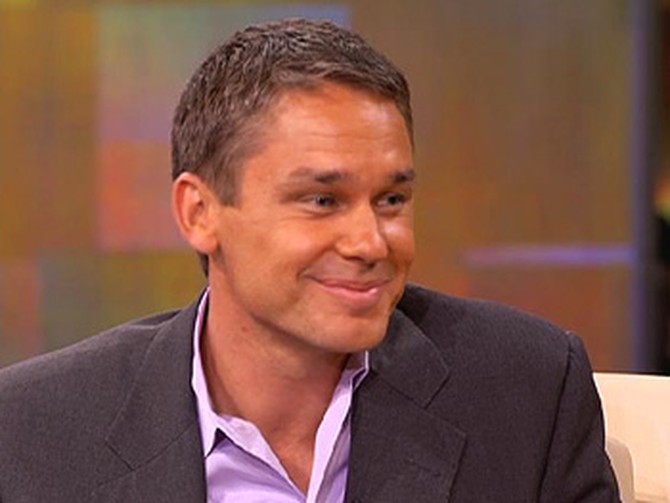
Are you unhappy in your job? You're not alone. Four out of five people quizzed in a CareerBuilder.com survey are unhappy at work—that's 84 percent of the nation's workforce!
Business expert and best-selling author Marcus Buckingham has helped millions of people reach new levels of success and happiness at work—including employees at Coca-Cola, Gap and Microsoft—with his radical "strengths training" approach. His key to success is simple: Stop spending so much time trying to fix your weaknesses. Instead, focus on what makes you special and unique. "A strength is an activity that makes you feel strong," he says. "If you want to know what your strength is, you've got to pay attention to how you feel. It feels like focus. It feels like concentration. You feel invigorated. Energized."
Another way to think of strengths training is to look at it as a report card. When a child comes home with a report card, Marcus says most parents would focus more on an F than an A. Really, they should give more attention to the A. "You grow the most in the area where you already show some natural advantage, some natural area of talent or strength or passion. That's where you start," Marcus says.
Marcus says being dissatisfied with work can filter into other areas of your life. "Your family [and] people that are the most important to you in your life are the ones that hurt," he says. "If you're going to win at life—if any of you or any of us are going to win at life—we've got to flip that switch."
Business expert and best-selling author Marcus Buckingham has helped millions of people reach new levels of success and happiness at work—including employees at Coca-Cola, Gap and Microsoft—with his radical "strengths training" approach. His key to success is simple: Stop spending so much time trying to fix your weaknesses. Instead, focus on what makes you special and unique. "A strength is an activity that makes you feel strong," he says. "If you want to know what your strength is, you've got to pay attention to how you feel. It feels like focus. It feels like concentration. You feel invigorated. Energized."
Another way to think of strengths training is to look at it as a report card. When a child comes home with a report card, Marcus says most parents would focus more on an F than an A. Really, they should give more attention to the A. "You grow the most in the area where you already show some natural advantage, some natural area of talent or strength or passion. That's where you start," Marcus says.
Marcus says being dissatisfied with work can filter into other areas of your life. "Your family [and] people that are the most important to you in your life are the ones that hurt," he says. "If you're going to win at life—if any of you or any of us are going to win at life—we've got to flip that switch."
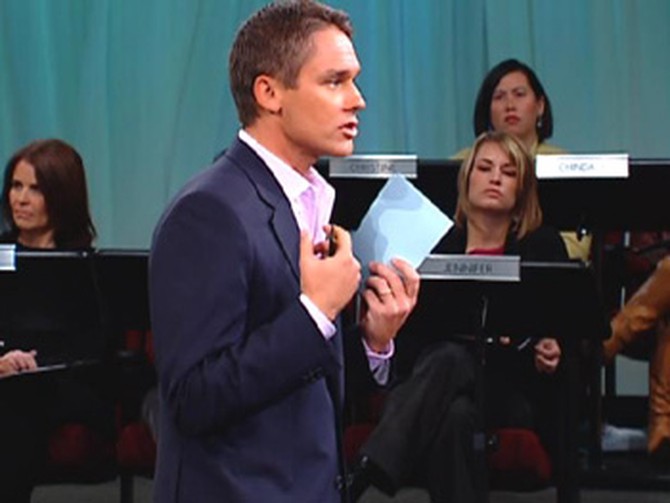
In October 2007, Oprah invited Marcus to Chicago to hold a special workshop for 30 working women to help them rediscover the passion in their careers. "Most of you in this room are not living a second-rate version of somebody else's life," Marcus told the group. "Most of you are living a second-rate version of your own. And what we have to help you to figure out how to do is to find your life within your life."
During the workshop, Marcus asked the participants one very important question: Do you play to your strengths during a typical day? Their answer was shocking. "We had nobody saying they played to their strengths most of the time," Marcus says. "When we asked them, 'Do you think you're the best judge of your strengths,' nobody said they're the best judge of their strengths."
The workshop also busted a common myth that led to many aha! moments—just because you're good at something doesn't mean it's a strength. If what you're doing completes you, it's a strength. If it depletes you, it's actually a weakness.
Ultimately, Marcus encouraged all the women to find something they are passionate about. "This is about contribution. It's about performance. It's about doing more and making it last," Marcus says. "If you're going to make a lasting contribution, then the activities that you're filling your job with have got to feed you."
During the workshop, Marcus asked the participants one very important question: Do you play to your strengths during a typical day? Their answer was shocking. "We had nobody saying they played to their strengths most of the time," Marcus says. "When we asked them, 'Do you think you're the best judge of your strengths,' nobody said they're the best judge of their strengths."
The workshop also busted a common myth that led to many aha! moments—just because you're good at something doesn't mean it's a strength. If what you're doing completes you, it's a strength. If it depletes you, it's actually a weakness.
Ultimately, Marcus encouraged all the women to find something they are passionate about. "This is about contribution. It's about performance. It's about doing more and making it last," Marcus says. "If you're going to make a lasting contribution, then the activities that you're filling your job with have got to feed you."

After the workshop, a team of Marcus's elite coaches worked with each woman—including Vanessa, a pharmaceutical sales rep who says she feels overwhelmed, underappreciated and overworked.
Vanessa and her husband have a beautiful daughter, but Vanessa admits she often feels like a single parent. "My husband is a resident. I just feel like I've constantly put my life on hold for his career. The pressure is horrible. I'm the breadwinner," she says. "I'd rather be spending time with my daughter than dropping her off at a daycare."
Vanessa says she used to love the excitement of her career, but now she just feels drained. "I can't say no. I'm not confrontational," she says. "I want to feel good about going to work, but I continue to load my plate and say yes to everything, when in reality, I don't have the time to do those things."
During her coaching session with Marcus, Vanessa comes to an important realization—the only person she says no to is her daughter. "I think that if I can provide her with financial stability, that's better than reading her a book at night," she says. "Now that I'm talking about it, it just makes me so sad."
To help Vanessa refocus her energy, Marcus says she must dig out of the hole she's created for herself at work. "You keep volunteering for more things to get more recognition and appreciation," he says. "What you're giving up is control. You've given up fuel. Energy. Passion. Purpose. You've given it all up to somebody and some circumstances outside of you."
Vanessa and her husband have a beautiful daughter, but Vanessa admits she often feels like a single parent. "My husband is a resident. I just feel like I've constantly put my life on hold for his career. The pressure is horrible. I'm the breadwinner," she says. "I'd rather be spending time with my daughter than dropping her off at a daycare."
Vanessa says she used to love the excitement of her career, but now she just feels drained. "I can't say no. I'm not confrontational," she says. "I want to feel good about going to work, but I continue to load my plate and say yes to everything, when in reality, I don't have the time to do those things."
During her coaching session with Marcus, Vanessa comes to an important realization—the only person she says no to is her daughter. "I think that if I can provide her with financial stability, that's better than reading her a book at night," she says. "Now that I'm talking about it, it just makes me so sad."
To help Vanessa refocus her energy, Marcus says she must dig out of the hole she's created for herself at work. "You keep volunteering for more things to get more recognition and appreciation," he says. "What you're giving up is control. You've given up fuel. Energy. Passion. Purpose. You've given it all up to somebody and some circumstances outside of you."
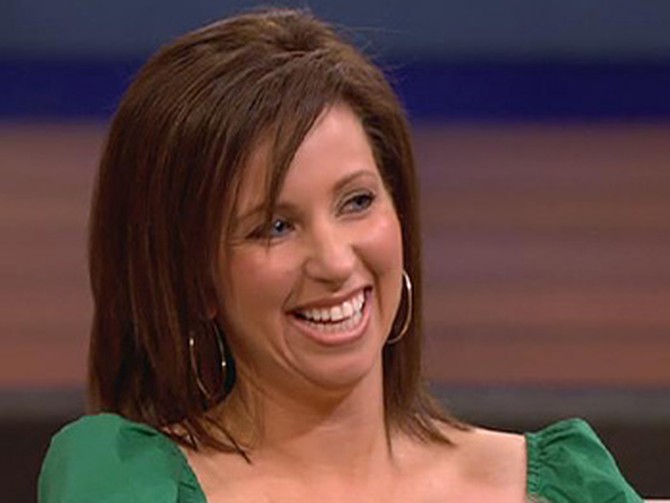
Six months after Marcus's workshop, Vanessa says her life has completely changed. "I'm spending more and more time with my daughter. We're taking swimming lessons. I turn the computer off at 5. I've also managed to focus on my strengths, embrace them," she says. Marcus says Vanessa has a desire to please, which is a skill that is often construed as a weakness. "That strength of hers to be able to woo people over and win them over, that's not a weakness," he says.
Now, the first person Vanessa says yes to is herself. "Saying no finally feels good. It empowers me," she says. " Once you're personally happy, everything else is kind of easy after that."
Now, the first person Vanessa says yes to is herself. "Saying no finally feels good. It empowers me," she says. " Once you're personally happy, everything else is kind of easy after that."
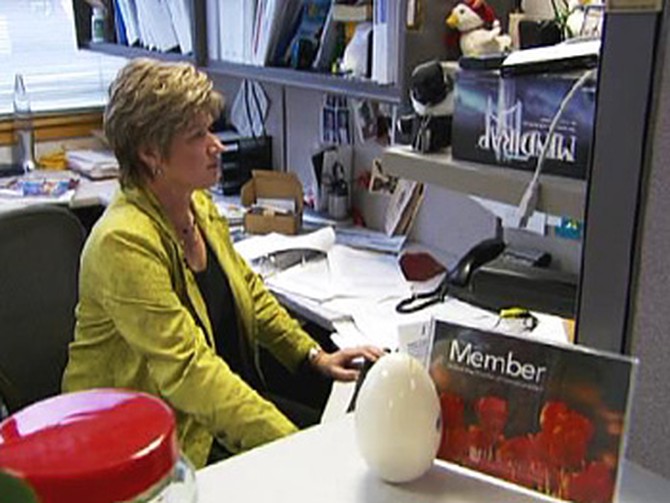
Another participant in Marcus's workshop is Beth, who works with her husband at the engineering firm they own. Beth's main responsibility is accounting—a job she loathes. "It really was my weakness. And my husband, he took my weakest area and made it my number one responsibility." Beth's worst nightmare is making a major accounting mistake that affects the well-being of her family and the families of their employees.
In her first coaching session with Marcus, Beth says her own personal failed history with finances paralyzes her with fear—but telling her husband she doesn't want to do it anymore scares her more. "The business and the marriage are so tightly tied, how do I get out of one and preserve the other?"
Marcus says Beth is making a serious mistake. "The mistake that you've made is trying to take on as much as you can so that you take care of everybody around you," he says. "It's going to break you, and you're going to have another failed marriage on your hands."
There's only one thing Beth can do, Marcus says. "You need to sit down and talk to [your husband] and change your job. You need to be able to go and say to him, 'This is what I need for us to be strong as a business and strong as a family.'"
In her first coaching session with Marcus, Beth says her own personal failed history with finances paralyzes her with fear—but telling her husband she doesn't want to do it anymore scares her more. "The business and the marriage are so tightly tied, how do I get out of one and preserve the other?"
Marcus says Beth is making a serious mistake. "The mistake that you've made is trying to take on as much as you can so that you take care of everybody around you," he says. "It's going to break you, and you're going to have another failed marriage on your hands."
There's only one thing Beth can do, Marcus says. "You need to sit down and talk to [your husband] and change your job. You need to be able to go and say to him, 'This is what I need for us to be strong as a business and strong as a family.'"

Nervous, Beth decided to tell her husband how she felt in small steps. However, Beth's anxiety took its toll before she could tell her husband everything. "I had so much stress," she says. "I was having nerve pain and going to physical therapy and missing work. I was having migraine headaches and missing work. I was dealing with my children and missing work. ... And I ended up in the hospital."
As Beth recovered, her husband went into her office to get her work in order. "He went through the office and really realized that I suck at paperwork and I really should not be doing that job," she says. "He reorganized everything and took it over from that day forth. So I am not in charge of the finances in that company any longer at all."
Since that decision, Beth says she hasn't had any nerve pain or a single migraine headache.
As Beth recovered, her husband went into her office to get her work in order. "He went through the office and really realized that I suck at paperwork and I really should not be doing that job," she says. "He reorganized everything and took it over from that day forth. So I am not in charge of the finances in that company any longer at all."
Since that decision, Beth says she hasn't had any nerve pain or a single migraine headache.

Not only is Beth's health better, so are other parts of her life. "I am taking time for me. I'm taking time to work out," she says. "I am spending time with my children. I'm attending to their needs. My daughter is 16, and she was so excited—for the first time in 16 years she has a stay-at-home mom. She thinks it's the best thing in the world."
Marcus says the lesson here is that while Beth has many strengths, she was not using them. "She's so darned talented," he says. "She's got an amazing design talent. Being able to step 20,000 feet above a situation, see all the moving parts and reconfigure them into the most effective pattern—she's genius at that. What she's rotten at is implementation."
This is a common business problem, Marcus says, where someone who's good at one thing is assumed to be good at something else. "You were a good basketball player, therefore you'll be a good coach. You're a good salesperson, therefore you'll be a good sales manager. You're a good individual contributor, therefore you should manage others," he says. "It isn't necessarily so."
Just because she was bad at implementing business strategies does not by any means signal that Beth is finished. "You have so much to contribute to the world," he says. "You need to stand up and own that."
Follow Beth's progress on her blog.
Marcus says the lesson here is that while Beth has many strengths, she was not using them. "She's so darned talented," he says. "She's got an amazing design talent. Being able to step 20,000 feet above a situation, see all the moving parts and reconfigure them into the most effective pattern—she's genius at that. What she's rotten at is implementation."
This is a common business problem, Marcus says, where someone who's good at one thing is assumed to be good at something else. "You were a good basketball player, therefore you'll be a good coach. You're a good salesperson, therefore you'll be a good sales manager. You're a good individual contributor, therefore you should manage others," he says. "It isn't necessarily so."
Just because she was bad at implementing business strategies does not by any means signal that Beth is finished. "You have so much to contribute to the world," he says. "You need to stand up and own that."
Follow Beth's progress on her blog.
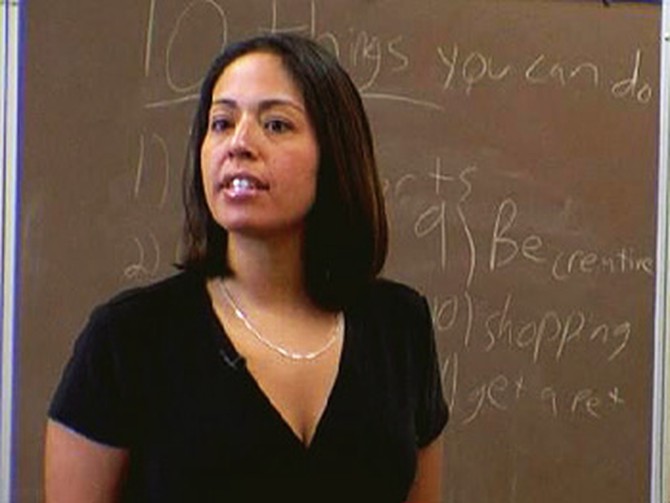
Rachel is an elementary school teacher who doesn't know the meaning of recess. Though she loves her students, she says she is so overcommitted—with class, meetings and volleyball practice—she doesn't have any time for her personal life. "Pretty much every day of my life I feel overwhelmed," she says. "The job never really ends. It continues on throughout the evening, throughout the weekend."
With her busy schedule, Rachel says she often sacrifices time with her fiancé, Pete. "I think he gets frustrated, too, that I don't give 100 percent to him," she says. "And I give 100 percent to my career." Rachel was feeling so guilty about missing quality time with Pete she decided to buy him a dog to keep him company.
Rachel says she wanted to be a teacher almost her entire life. "Now I'm to the point in my career where I'm not enjoying being in the classroom," she says.
Marcus says Rachel's overcommitment issues at work are an attempt to feel more and that her sadness is not just that she disappoints others, but herself too. He suggests Rachel start to alter her life by doing simple things for herself. "You filled up your life here with so much noise," Marcus says. "You can't really see the voice inside you that was always calling you into the classroom in the first place. And I think that's what we've got to try and get back."
With her busy schedule, Rachel says she often sacrifices time with her fiancé, Pete. "I think he gets frustrated, too, that I don't give 100 percent to him," she says. "And I give 100 percent to my career." Rachel was feeling so guilty about missing quality time with Pete she decided to buy him a dog to keep him company.
Rachel says she wanted to be a teacher almost her entire life. "Now I'm to the point in my career where I'm not enjoying being in the classroom," she says.
Marcus says Rachel's overcommitment issues at work are an attempt to feel more and that her sadness is not just that she disappoints others, but herself too. He suggests Rachel start to alter her life by doing simple things for herself. "You filled up your life here with so much noise," Marcus says. "You can't really see the voice inside you that was always calling you into the classroom in the first place. And I think that's what we've got to try and get back."

Marcus says Rachel's desire to take on so much isn't necessarily from a desire to please as much from a desire to take on more and more responsibility. "I felt if I didn't do it, I was letting somebody else down," she says. "That nobody else would possibly take their role."
Over time, Marcus says, Rachel's abundance of extracurricular activities made her forget why she loved being a teacher in the first place. To combat this he asked her to put an "S" and "W" in her weekly planner next to her strengths and weakness and to then focus on her strengths. "In order to find yourself ... you had to discover the emotion[s] you felt when you felt strong in the classroom," Marcus says. "You didn't find someone else's life, you found your life again."
Since her meeting with Marcus, Rachel has been paring down her commitments and doing things for herself. "I'm getting married in two months, and there's a lot of planning right there," she says. "I was able to put aside the different things that I was involving myself with and take the time to spend on things that I enjoyed."
Over time, Marcus says, Rachel's abundance of extracurricular activities made her forget why she loved being a teacher in the first place. To combat this he asked her to put an "S" and "W" in her weekly planner next to her strengths and weakness and to then focus on her strengths. "In order to find yourself ... you had to discover the emotion[s] you felt when you felt strong in the classroom," Marcus says. "You didn't find someone else's life, you found your life again."
Since her meeting with Marcus, Rachel has been paring down her commitments and doing things for herself. "I'm getting married in two months, and there's a lot of planning right there," she says. "I was able to put aside the different things that I was involving myself with and take the time to spend on things that I enjoyed."
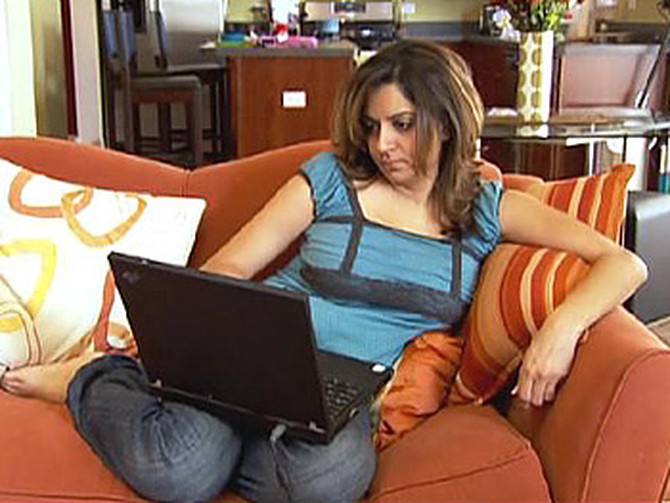
Because Ayesha works from home, she says she has trouble distinguishing where work life starts and her home life ends. "I alternate between work and my personal life all day until 2 in the morning. It's both things all the time," she says. "I feel tortured all the time—24 hours a day."
The all-day nature of her job makes it difficult for her to focus on work for any longer than an hour. "When you enjoy doing dishes more than you enjoy work, you have to wonder," she says.
Marcus says his coaching session with Ayesha was one of the most challenging of his career. When Ayesha started writing down all of the things she didn't like about her job—green cards indicate strengths, while red cards indicate weakness—everything was red. "She wrote down all the things she loathed in a week, which was basically her job description," Marcus says. "Which is a problem."
The abundance of red cards for Ayesha was troubling. "We see your red cards, and we know that your job is not calling that calling," Marcus says. "My job is to go, 'What is it then? What is it that strengths you? Where are the green cards?'"
The all-day nature of her job makes it difficult for her to focus on work for any longer than an hour. "When you enjoy doing dishes more than you enjoy work, you have to wonder," she says.
Marcus says his coaching session with Ayesha was one of the most challenging of his career. When Ayesha started writing down all of the things she didn't like about her job—green cards indicate strengths, while red cards indicate weakness—everything was red. "She wrote down all the things she loathed in a week, which was basically her job description," Marcus says. "Which is a problem."
The abundance of red cards for Ayesha was troubling. "We see your red cards, and we know that your job is not calling that calling," Marcus says. "My job is to go, 'What is it then? What is it that strengths you? Where are the green cards?'"

After five or six more sessions with Ayesha, Marcus says they finally found her strength. "What she is amazing at ... is finding stories in regular life and writing about them," he says.
Since then Ayesha has started a writing blog, in which she writes about real people and tries to find life lessons in their stories. "You use it as an excuse to meet these people and interview them and tell their story and hope that there's somebody else out there who it will inspire," she says. Ayesha also enrolled in a media boot camp to learn how to do a video version of her blog. She even contacted a friend in the journalism field and now has a part-time internship doing Web production.
Marcus says what Ayesha had been trying to do is impossible. She had buried her dream for years, hoping that one day she'd be able to just dig it up. "But because you're so depleted after 10 years, your perseverance, your feeling of fulfillment and success, is gone. When you try and wake yourself back up, you're not there anymore. You're gone. You are almost unrecognizable to yourself," he says. "Strengths are a map, and they can help you know where you are, they can help you find a new way forward, they can help you tell someone else where you are. They do everything a map does."
Since then Ayesha has started a writing blog, in which she writes about real people and tries to find life lessons in their stories. "You use it as an excuse to meet these people and interview them and tell their story and hope that there's somebody else out there who it will inspire," she says. Ayesha also enrolled in a media boot camp to learn how to do a video version of her blog. She even contacted a friend in the journalism field and now has a part-time internship doing Web production.
Marcus says what Ayesha had been trying to do is impossible. She had buried her dream for years, hoping that one day she'd be able to just dig it up. "But because you're so depleted after 10 years, your perseverance, your feeling of fulfillment and success, is gone. When you try and wake yourself back up, you're not there anymore. You're gone. You are almost unrecognizable to yourself," he says. "Strengths are a map, and they can help you know where you are, they can help you find a new way forward, they can help you tell someone else where you are. They do everything a map does."

Do you feel depleted? Are you ready for a career intervention?
Take Marcus Buckingham's online career workshop—anytime, anywhere!
Get access to an online companion workbook and a syllabus to help guide you through the entire eight-course online workshop. The workshop is also available for free on iTunes.
If you have questions, Marcus will be offering answers on the workshop's message board. Plus, you'll be able to network with other working women, meet the participants and share your own story.
See how this workshop has already changed lives.
"It has to start here," Marcus says. "If you can take yourself seriously, look in the mirror and say to yourself every day, 'What are my strengths, and how can I contribute them today?' That will give you a chance to see the best of you."
Take Marcus Buckingham's online career workshop—anytime, anywhere!
Get access to an online companion workbook and a syllabus to help guide you through the entire eight-course online workshop. The workshop is also available for free on iTunes.
If you have questions, Marcus will be offering answers on the workshop's message board. Plus, you'll be able to network with other working women, meet the participants and share your own story.
See how this workshop has already changed lives.
"It has to start here," Marcus says. "If you can take yourself seriously, look in the mirror and say to yourself every day, 'What are my strengths, and how can I contribute them today?' That will give you a chance to see the best of you."
Published 01/01/2006

